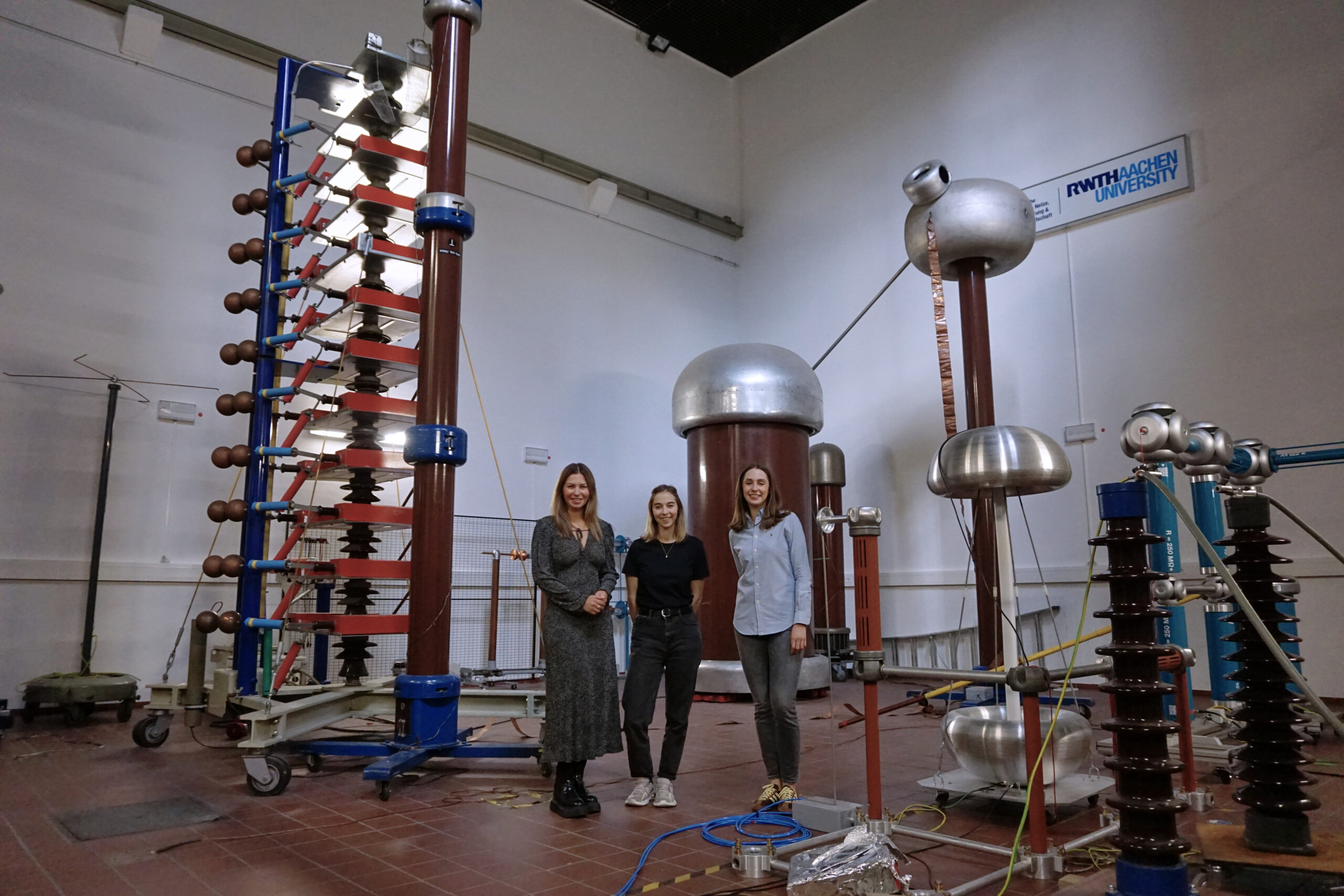
In der Praxis können Blitzeinschläge und andere extreme Einflüsse die Strominfrastruktur an ihre Grenzen führen. Um einen sicheren Betrieb zu gewährleisten, werden Untersuchungen unter Einsatz von Hochspannungserzeugern durchgeführt.
Das Lehr- und Forschungsgebiet für Hochspannungstechnologie (HVT) beteiligt sich aktiv an der Entwicklung neuer Lösungen für die Energiewende. Drei Teammitglieder geben hier einen Einblick in ihren Berufsalltag.
Mit eurer Forschungsarbeit setzt ihr euch dafür ein, die Grenzen der Innovation im Energiesektor zu verschieben. Aber wo habt ihr angefangen? Alexandra, welche Schulfächer haben dich interessiert und wie ging es weiter?
„Die Reise in den Energiesektor begann für mich bereits in der Schulzeit. Schon früh hatte ich ein starkes Interesse an den naturwissenschaftlichen Fächern, besonders an Physik und Mathematik. In meiner Schulzeit hatte mein Gymnasium eine direkte Kooperation mit der Universität, an der ich später meinen Bachelorabschluss gemacht habe. Im Rahmen dieses Programms konnten wir nach dem Unterricht an zusätzlichen Kursen teilnehmen, durch die wir verschiedene Aspekte und Arten von MINT-Fächern besser kennenlernen konnten. Physik hat mich immer fasziniert, aber es wurde schnell klar, dass ich lieber ein Ingenieurfach studieren wollte. Was mich letztendlich zur Elektrotechnik führte, war mein Wunsch, konkrete Probleme zu lösen und Innovationen voranzutreiben.“
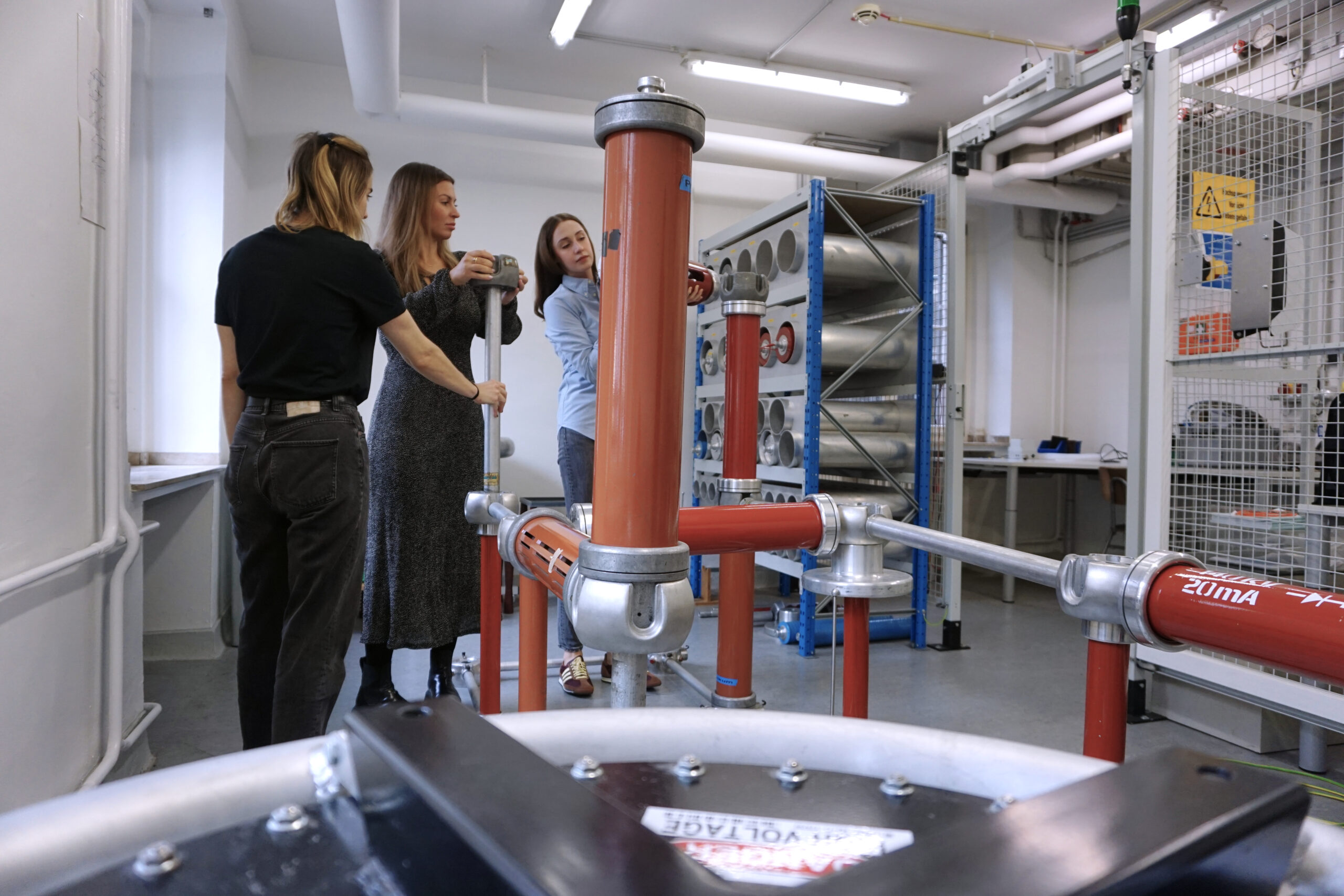
Für Studierende der Fachrichtung Elektrotechnik und Informationstechnik steht ein Prüfstand bereit, an dem sie die Möglichkeit haben, ihr theoretisches Wissen in der Praxis zu erproben.
Der rasche Umbau des Energiesystems bringt neue Herausforderungen mit sich. Stromautobahnen (Übertragungsnetze) wie Südlink und Südostlink sollen Strom aus On- und Offshore-Windparks aus dem Norden in alle Teile der Bundesrepublik transportieren. Dabei kommt die Hochspannungs-Gleichstrom-Übertragung (HGÜ) zum Einsatz. Ihr forscht an Isoliersystemen unter Gleichstrombelastung. Was sind die Vorteile von Gleichstrom (DC) gegenüber Wechselstrom (AC)? Und warum ist ein zuverlässig funktionierendes Isolationssystem besonders wichtig?
„Projekte wie Südlink und Südostlink nutzen Hochspannungs-Gleichstrom-Übertragung, um Strom effizient über weite Strecken zu transportieren. HGÜ hat gegenüber Wechselstrom den Vorteil, dass es geringere Übertragungsverluste, höhere Übertragungskapazitäten und eine verbesserte Netzstabilität bietet. Außerdem kann HGÜ einfach in bestehende Netze integriert werden. Ein zuverlässig funktionierendes Isolationssystem ist dabei besonders wichtig, weil es die Sicherheit und Effizienz der gesamten Übertragung gewährleistet. Neben dem Standhalten der hohen Belastungen durch die Energieübertragung im stationären Zustand muss die Isolierung auch kurzfristige Transienten mit Überspannungen aushalten können. Die korrekte Funktion des Isolationssystems ist entscheidend für den ordnungsgemäßen Betrieb des gesamten Energiesystems, da kritische Infrastrukturen wie Energiekabel sowie Umrichter- und Leistungstransformatoren ein einwandfrei funktionierendes Isolationssystem benötigen. Unsere Forschung konzentriert sich darauf, diese Systeme zu optimieren und somit die Zuverlässigkeit und Lebensdauer der Übertragungsnetze zu erhöhen, was letztlich die Energiewende unterstützt.“
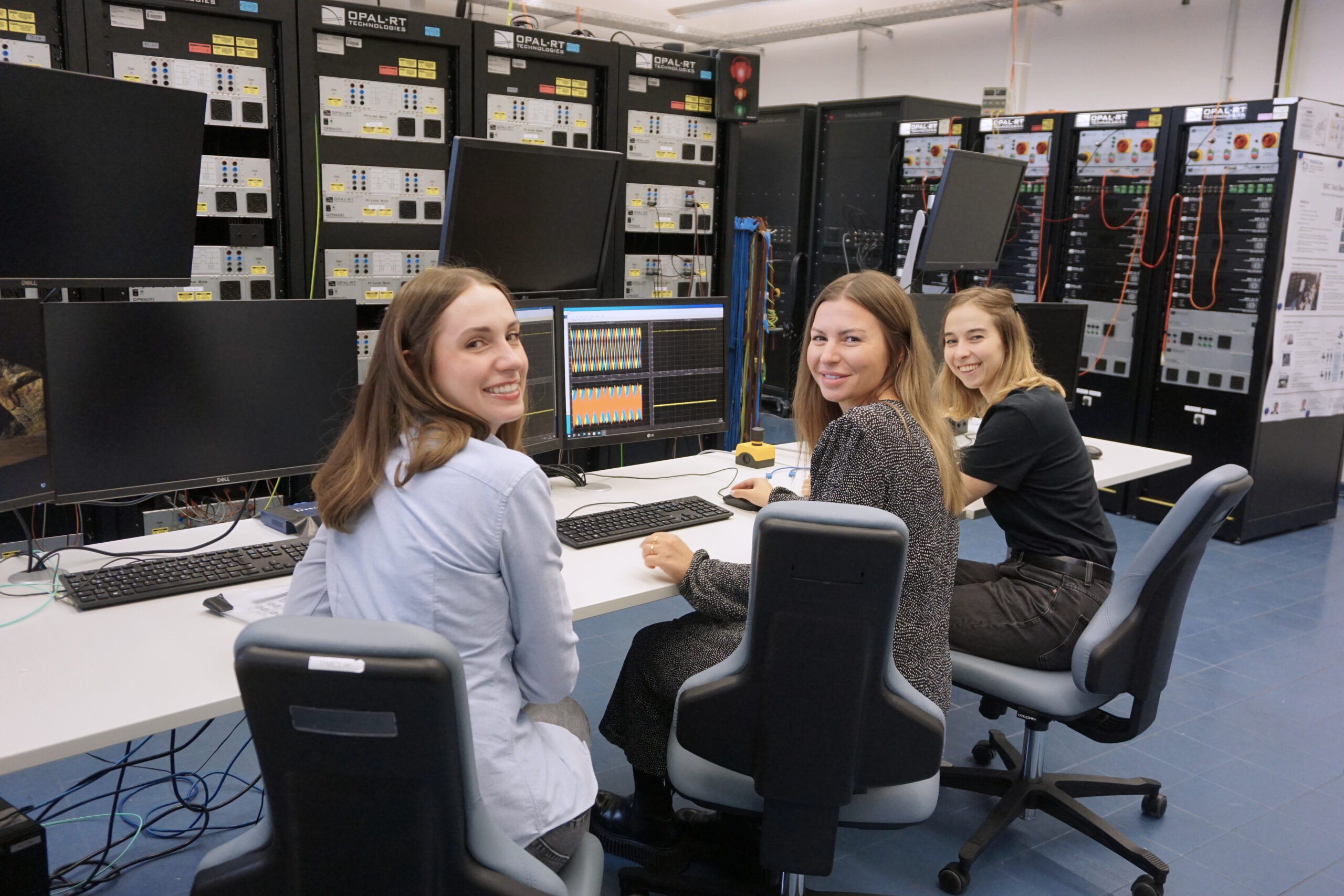
Ein Anwendungsbeispiel für das MMC Test Bench: Die sichere und „intelligent“ geregelte Integration von Strom aus Offshore-Windparks in das Übertragungssystem an Land. Acht laborskalierte modulare Multilevel-Umrichter (MMCs) ermöglichen die Simulation verschiedener Systeme und Szenarien in Echtzeit und machen die Umsetzung der Energiewende planbar.
In einer Vision der Zukunft fahren wir in autonomen Automobilen, die wir mit regenerativem Strom aus dem „intelligenten Stromnetz“ aufladen. Welche Anforderungen werden aus Sicht eurer Forschung an das Stromnetz gestellt? An welchen zukunftsweisenden Entwicklungen arbeitet ihr? Und welche Projekte findet ihr besonders spannend?
„Das Stromnetz muss zahlreiche Anforderungen erfüllen, um die Energieversorgung zuverlässig und effizient zu gestalten. In unserem Forschungsbereich arbeiten wir an verschiedenen Aspekten der Energiewende, unterteilt in die Teams Isoliersysteme, Primärtechnik und Diagnostik sowie DC-Systeme. Dies ermöglicht uns, sowohl das „große Bild“ des Stromnetzes als auch das „kleine Bild“ der entscheidenden Komponenten im Stromnetz abzudecken. Da der Fokus heutzutage auf dem neuen grünen Energiesystem liegt, das aus erneuerbaren Energien und umweltfreundlichen Leistungsschaltern besteht, arbeiten wir an spannenden Projekten, die diese Transformation ermöglichen. Dazu gehören unter anderem DC-Schalter für Gleichstromsysteme und moderne, umweltfreundliche Isoliersysteme für verschiedene Anwendungen. Ein weiterer wichtiger Aspekt unserer Arbeit ist die Integration neuer Technologien in bestehende Systeme, um einen reibungslosen Übergang zu gewährleisten. Besonders spannend finde ich Projekte, die sich mit der Weiterentwicklung und Anpassung der vorhandenen Ausrüstung im Rahmen der Energiewende beschäftigen. Diese Arbeit trägt dazu bei, dass das bestehende Stromsystem weiterhin effizient und zuverlässig funktioniert, während wir gleichzeitig die Umstellung auf erneuerbare Energien und moderne Technologien vorantreiben.“
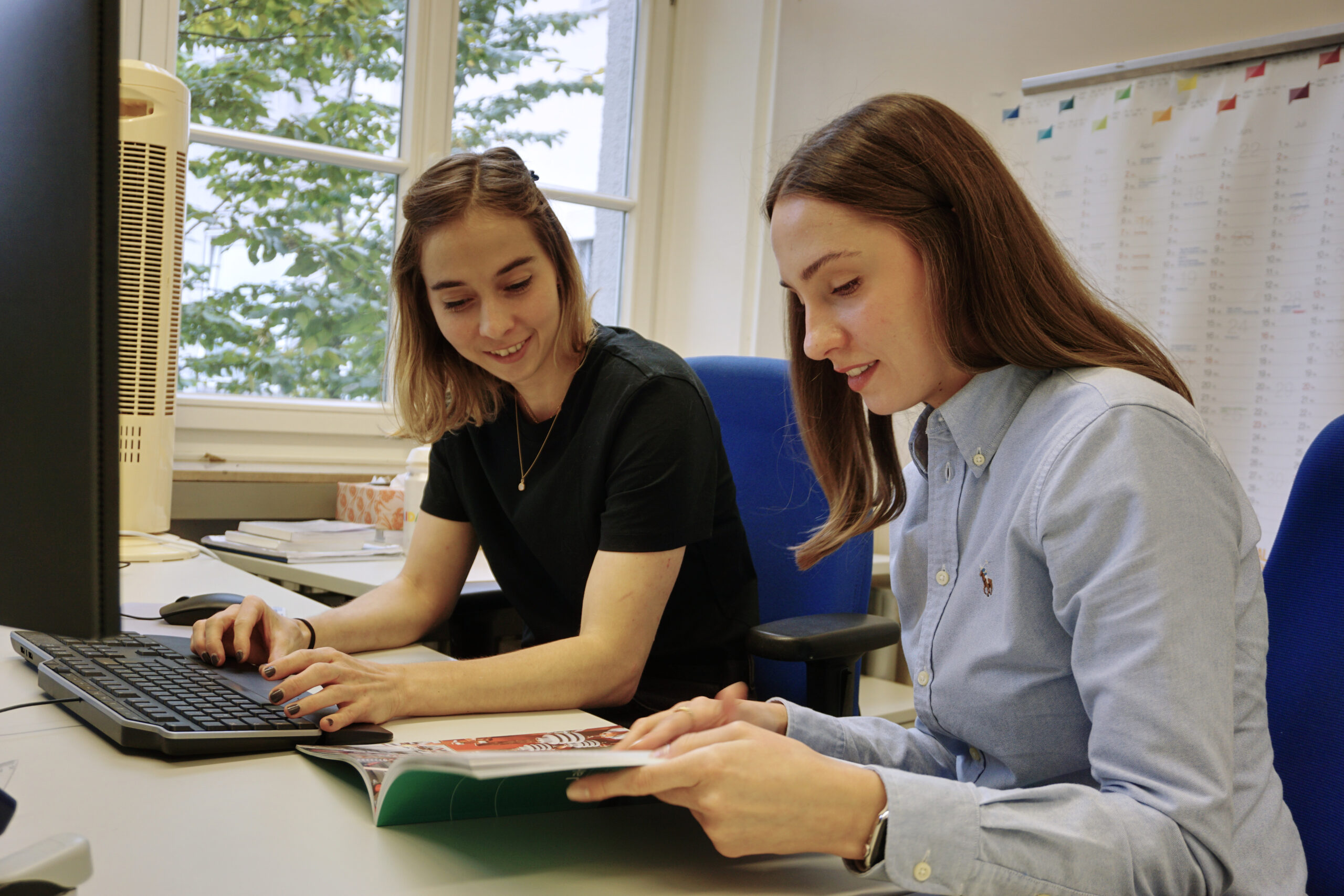
Von links: Verena West forscht an neuartigen Leistungsschaltern als Komponenten eines vermaschten Wechselstromnetzes. Aleksandra Wiecha beschäftigt sich in ihrer Forschungsarbeit mit der Lebensdauer von Isoliersystemen unter den Anforderungen dezentraler Energieerzeugung und -versorgung.
Eure Forschung umfasst ein breites Spektrum von modernen elektrischen Anlagen bis hin zu Regelungs- und Schutzkonzepten für zukünftige Stromnetze. Dafür steht euch eine hochmoderne Laborinfrastruktur zur Verfügung. Verena, wie sieht ein typischer Arbeitstag aus? Welche Arbeitsinhalte sind darüber hinaus wichtig? Welchen Stellenwert haben Teamarbeit und andere Soft Skills?
„Morgens beginne ich mindestens eine Stunde bevor ich mit den Studierenden (AbschlussarbeiterInnen und HiWis) im Labor anfange. In dieser Zeit bearbeite ich meine E-Mails und versuche mir Zeit für die Arbeit an meinem Dissertationsthema zu nehmen. Wenn die Studis da sind, gehen wir den Plan für den Labortag durch und ich gebe ihnen die Freigabe, mit den Experimenten zu beginnen. Danach setze ich mich wieder an den Schreibtisch und arbeite an verschiedenen Projekten, der Auswertung von Versuchsergebnissen oder an meiner Dissertation. Falls es Probleme im Labor gibt, helfe ich dort aus. Für mich steht die Teamarbeit hier besonders im Fokus, da man ohne Zusammenarbeit im Labor nicht weit kommt. Dabei ist gerade die Unterstützung und Einarbeitung von erfahrenen KollegInnen sehr hilfreich. Da die Arbeit als wissenschaftliche Mitarbeiterin viele verschiedene Themen umfasst, ist auch die Fähigkeit sich schnell in neue Problemstellungen hereinzuarbeiten, enorm wichtig, ebenso wie ein gutes Zeitmanagement.“
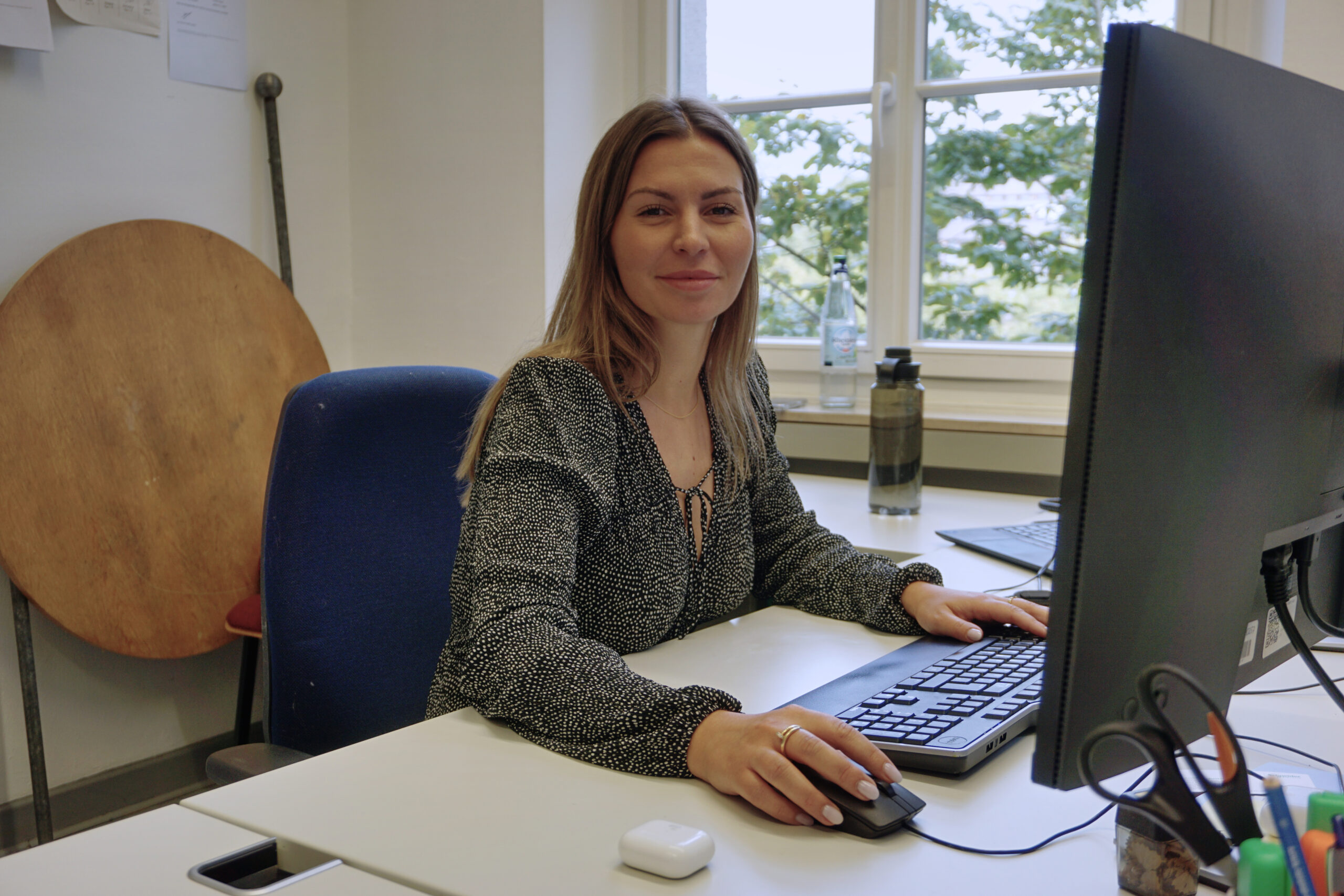
In ihrer Forschungsarbeit untersucht Sarah Anhaus den Schutz von Wechselstromleitungen im Übertragungsnetz bei steigendem Anteil erneuerbarer Energien.
Vielfalt und Chancengleichheit sind zentrale Werte in eurem Team. Sarah, was bedeutet Work-Life-Balance für dich persönlich und lebst du sie bereits?
„Work-Life-Balance ist in der heutigen Zeit ein beliebtes Trendthema. Neben meinem Arbeitsleben pendle ich regelmäßig zwischen meinem Wohnort Bayern und Aachen. Diese Situation stellt eine besondere Herausforderung dar, eine perfekte Balance zu finden. Ich habe gelernt, dass Work-Life-Balance nicht unbedingt eine gleichmäßige Verteilung der Zeit zwischen Arbeit und Privatleben bedeutet. Vielmehr geht es darum, Prioritäten zu setzen und Kompromisse einzugehen, um beide Bereiche bestmöglich zu integrieren. Es ist entscheidend, individuell zu definieren, was Work-Life-Balance für einen selbst bedeutet, anstatt sich nur an allgemeinen Trends zu orientieren. Um meine beruflichen und persönlichen Verantwortlichkeiten in Einklang zu bringen, setze ich auf klare Priorisierung und gute Organisation. Ich nehme mir bewusst Zeit für Sport, Unternehmungen mit Familie & Freunden, Reisen und auch für Ruhephasen, um eine nachhaltige Balance zu gewährleisten. Dabei spielt die Unterstützung meines Umfelds eine große Rolle. Natürlich gibt es Phasen, in denen ein Bereich mehr Aufmerksamkeit erfordert als der andere, aber insgesamt strebe ich stets danach, ausgeglichen zu sein.“
Lass dich inspirieren und finde deinen eigenen Weg!
Auf unserer Website informieren wir dich über unser Studienangebot.




Schreibe einen Kommentar